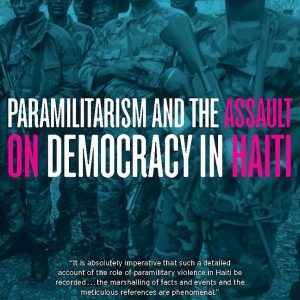Book Exposes Violent Role of Paramilitaries in Haiti
By Judith Scherr
OAKLAND, California, Aug 16 2012 (IPS) – Haiti’s brutal army was disbanded in 1995, yet armed and uniformed paramilitaries, with no government affiliation, occupy former army bases today.
President Michel Martelly, who has promised to restore the army, has not called on police or U.N. troops to dislodge these ad-hoc soldiers.
Given the army’s history of violent opposition to democracy, Martelly’s plan to renew the army “can only lead to more suffering”, says Jeb Sprague in his forthcoming book Paramilitarism and the Assault on Democracy in Haiti, to be released mid August by Monthly Review Press.
The role of Haiti’s military and paramilitary forces has received too little academic and media attention, says Sprague, a doctoral candidate in sociology at the University of California, Santa Barbara. He hopes his book will help to fill that gap.
Sprague researched the book over more than six years, traveling numerous times to Haiti, procuring some 11,000 U.S. State Department documents through the Freedom of Information Act, interviewing more than 50 people, reading the Wikileaks’ files on Haiti, and studying secondary sources. The author is an academic, but he doesn’t strive for neutrality. His is an unapologetic belief in the right of the Haitian masses to control their destiny.
To support his narrative, Sprague includes 100 pages of footnotes.
“I know there will be critics of the book,” he told IPS, “I wanted to have a lot of information there to back up what I’m saying, so it’s not just seen as conjecture or rumour.”
In his historical analysis, Sprague takes the reader back to the “poison gift” the U.S. gave Haiti during its 1915-1934 occupation: an army “that would continue the U.S. occupation long after U.S. troops were gone,” Sprague writes, explaining that U.S. Marines created an army “subservient to the interests of the U.S., the bourgeoisie, and the big landowners”.
Sprague writes about the period of the father and son dictators Duvalier, 1957-1986, when the U.S. considered the Haitian army a “bulwark” against the spread of communism. He explores the military’s “incestuous” relationship to the Duvaliers’ infamous Tontons Macoute, whose purpose, he writes, was “to extort and attack government critics, often acting as secret police or executioners”.
After the Duvaliers, paramilitary forces continued their violence. In 1988, gunmen were thwarted in their attempt to murder the liberation theologian priest Jean Bertrand Aristide, whose popularity was rising; 13 people were killed and 80 injured in the attack.
The gunmen didn’t act alone. Sprague ties these paramilitaries to a former Macoute trained at the School of the Americas, the mayor of Port-au-Prince and wealthy businesspeople.
Throughout the book, Sprague underscores links between paramilitary forces committing overt violent acts and the often-hidden forces of wealth, and national and international political power supporting the paramilitaries….
Read the entire review from Inter Press Service

Comments are closed.